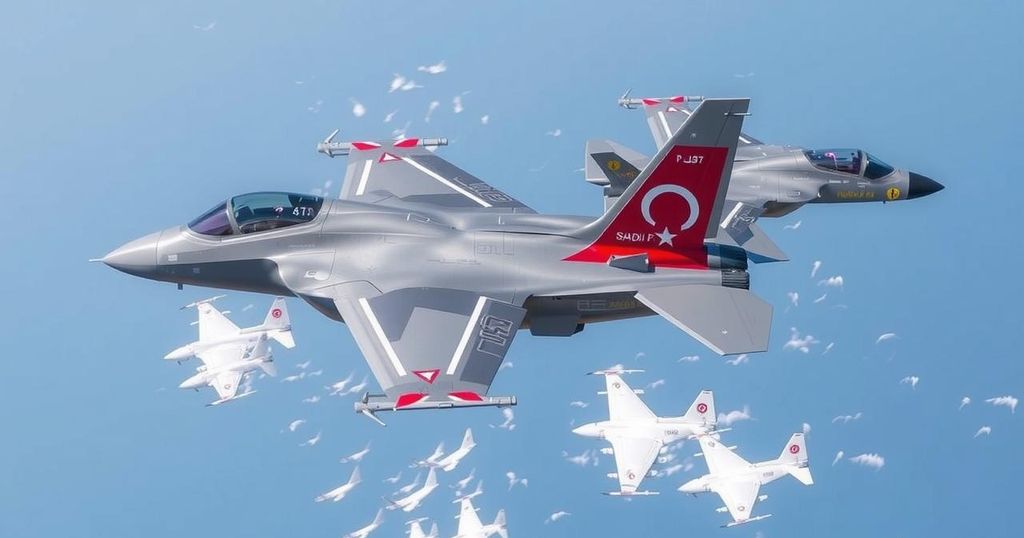Saudi Arabia is in discussions to acquire up to 100 Turkish Kaan fighter jets amid challenges in obtaining US F-35s. The negotiations, involving key Turkish defense officials, emphasize technology transfer and joint production opportunities, reinforcing Saudi Arabia’s strategy to diversify its defense procurement sources. This initiative follows previous agreements strengthening defense collaborations between Saudi Arabia and Turkey, reflecting Saudi Arabia’s goals for self-sufficiency in military capabilities.
Saudi Arabia has initiated negotiations with Turkey to procure up to 100 Kaan fifth-generation fighter jets. The discussions, held in Istanbul during a three-day meeting led by Türkiye’s Defense Industry President, Haluk Görgün, involved key Saudi defense officials, including Deputy Defense Minister Khaled bin Hussein Al-Biyari and Air Force Commander Turki bin Bandar Al Saud. This potential deal is viewed as a means for Saudi Arabia to diversify its defense procurement sources in light of ongoing challenges in acquiring the U.S.-made F-35 fighter jets.
Historically, Saudi Arabia has struggled to secure F-35 purchases, having made formal requests since 2012 without success. The desire to update its military capabilities is further underscored by prior agreements, such as the $3.1 billion deal in 2023 for 60 Baykar AKINCI unmanned aerial vehicles, with expected delivery between 2025 and 2026. Key discussions relating to the Kaan jets included joint production opportunities and technology transfer agreements, aiming for deliveries anticipated in the 2030s.
Saudi officials have engaged with Turkish defense companies—TAI, Aselsan, and Roketsan—to gain insights into the Kaan’s capabilities and explore strategic defense collaborations. This partnership exemplifies Saudi Arabia’s intent to lessen its dependency on U.S. military systems, reflecting a broader trend towards enhancing self-sufficiency in defense manufacturing. Besides Kaan, other alternatives the Kingdom is considering include France’s Rafale and China’s J-31 jets.
The Kaan fighter jet, developed by Turkish Aerospace Industries (TAI), is characterized as a twin-engine stealth aircraft tailored for air superiority and multirole missions. The program, which commenced in 2016 with a financial commitment of $1.18 billion, aims to supplant Türkiye’s aging F-16 fleet, leveraging international collaborations with entities like BAE Systems and Rolls-Royce. The Kaan is designed with advanced features to achieve a combination of stealth and combat effectiveness, and includes indigenous munitions, enhancing its capabilities in modern warfare scenarios.
Ukraine has also expressed interest in the Kaan, with discussions ongoing regarding its acquisition alongside plans for cooperative technology development between Turkish and Ukrainian engineers, which can bolster their mutual defense initiatives.
As geopolitical dynamics evolve, nations such as Saudi Arabia are reassessing their military procurement strategies, particularly following difficulties in acquiring advanced U.S. weaponry. The Kaan fighter jets, emerging from a collaboration between Turkey and its defense industry partners, present an attractive alternative for countries looking to modernize their air forces. This shift is influenced by factors such as regional stability concerns and the desire for greater technological independence in defense capabilities. Turkey’s extensive experience in drone production further emboldens its position as a credible supplier of advanced military aircraft, enhancing its global influence in defense markets.
The prospective deal for 100 Kaan fighter jets signifies a pivotal moment in the defense relationship between Saudi Arabia and Turkey, marking a transition towards greater collaboration in military capabilities. For Saudi Arabia, the acquisition aligns with its strategic objectives to modernize its air force and reduce reliance on traditional U.S. suppliers. Similarly, for Turkey, this agreement represents a substantial leap as it continues to position itself as a key player in the global defense industry. As both nations pursue enriched defense capabilities, the implications of this partnership will undoubtedly resonate in regional and international security landscapes.
Original Source: armyrecognition.com






